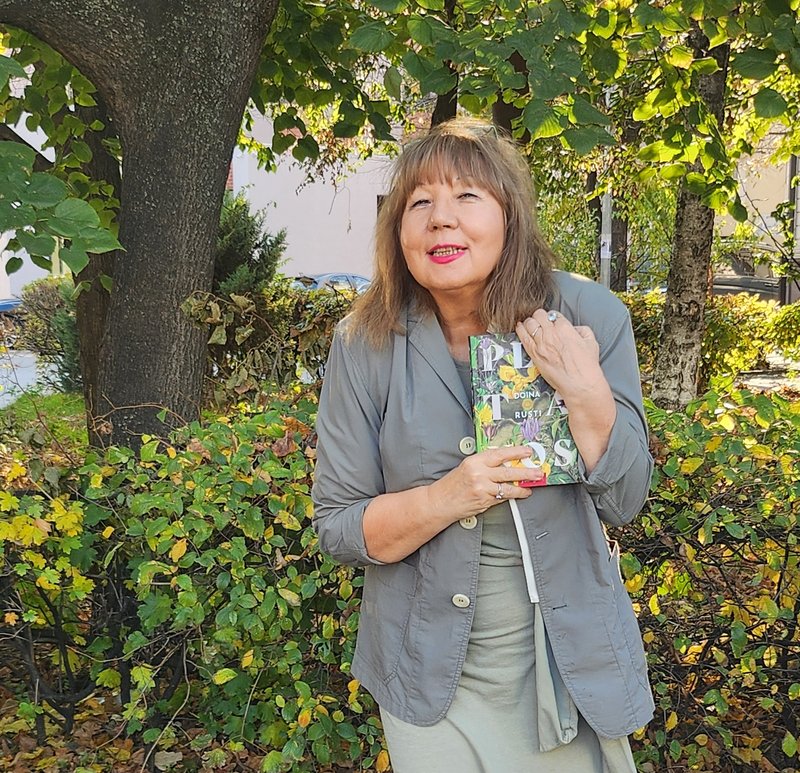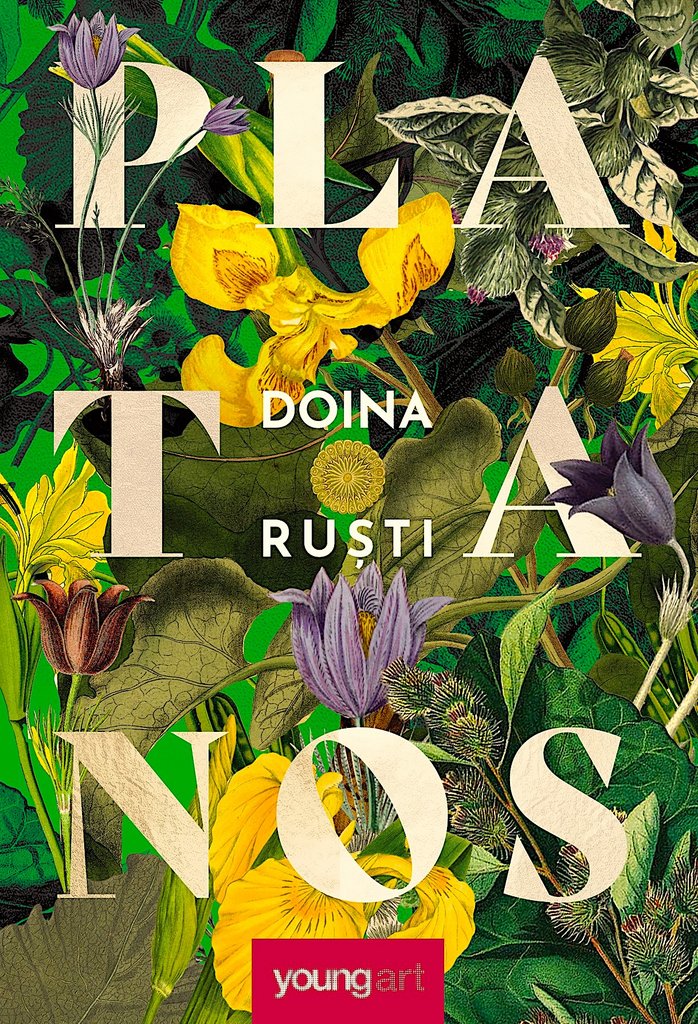
“— Why aren’t you a librarian?”
He stared at me in utter disbelief.
“— A librarian?! Son, I’d rather you beat me up than make me read.”
“— And you like unclogging toilets?” I asked.
“— I don’t like it. But what the hell else should I do? At least here it’s a proper building. I’ve had worse jobs, believe me. I even worked in construction—you should’ve seen how damned hard that was!”
This seemingly simple—and undeniably sincere—exchange is the spark that turns the world upside down in Platanos, the newest novel by Doina Ruști, published by Youngart. A dialogue between Iulian and his father, through which we glimpse all the son’s disappointment and the man’s total resignation. A muted confrontation between one’s expectations and the other’s limitations.

The novel continues a short story of the same name, included in the Romanian Language textbook for the 8th grade (Art Publishing), which became very popular among students and teachers alike. The mysterious and beguiling story of Platanos is here completed and deepened, as Doina Ruști weaves a narrative full of characters who stay with you long after you close the book—just as she has done in her previous novels and stories, from The Ghost in the Mill and Lizoanca at the Age of Eleven to Homeric and Ferenike, many of which have been translated and published abroad.
Before we learn that Platanos once had another name and dreamed of rising—at least himself, if his father refused to—from the humble condition in which he lived, we meet him in all his splendor, as he first appeared to the narrator-protagonist of the novel, through whose eyes we witness the entire story. The impression he makes on the narrator immediately marks him as a true hero:
“At first I thought he came from a high-born family, perhaps some distinguished people descended from ancient princes or at least from lofty officials—the kind who travel widely, live in big houses filled with books and beautiful things. You can spot such people not because they’re better dressed but because of their indulgent way of speaking to you. They look at you smiling, eager to please, and yet you still feel as if they’ve done you a favor. He was that sort of man, lit from within by a gentle clemency that instantly turns you into a cat caught in the rain.”
His square-shouldered jacket, his cheerful voice, and his enigmatic appearance set him apart from the other patients in Dr. Anatol’s clinic. And when he tells the story of his name, admiration quickly turns to love:
“In that moment of astonishment that warmed us all, he told us his name.
— Platanos.
Normally we would have laughed—not only did it sound ridiculous, but it carried a kind of pretentiousness, something stiff, like a plastic flower.
— Plātanos, he repeated, stressing the first a.
His voice sounded friendlier now, and our smiles faded.
— It’s the name I chose for myself. And you?
— Us what? I muttered.
— What name did you choose?
Of course, no one had ever told us we had the right to choose our own name...”
How could you not look with hope and trust upon someone who’s chosen such a name—especially when your own name is Vio, or Nosey, or Button, or Sisinel, like the narrator himself? How could you not believe everything such a man tells you, one who knows so much about everything, but above all about the Golden Sphere? How could you not want to be near someone who’s read with such passion The Count of Monte Cristo, Treasure Island, Alone in the World, Michael, the Circus Dog, and so many others? How could you not, without the slightest doubt, surrender to the stories he tells during those long idle days?
“Platanos knew extraordinary things, and for weeks we listened, frozen, completely transported to that city we saw every day only as a heap of bodies and shapes. We didn’t dare interrupt him, and at night, instead of sleeping, we thought of all he had told us. If we could have, we would have crossed the river right then—but none of us could leave our place.”
One of those extraordinary things concerned his past—his parents, and the beginning of his transformation. The onset of his vegetal state. The illness had taken hold of him as it had the others in the clinic, and he too was left alone when his father was struck down by the orange fungus, for his mother had died giving birth to him. Yet, unlike the others’ parents, his father seemed to know more about this terrible plague: he had been a librarian at the National Library and was obsessed with old books—especially one, Historia Hybridarum (The History of Hybrids), “the fabulous chronicle of beings half-human, half something else—animals, insects, or plants.”
Soon he became obsessed with a particular chapter: Liber Fabricatoris—The Book of Fabricator—which described the experiments and formulas of a scholar named Fabricator, “who lived toward the end of the first century of our era.” From then on, the man’s life was divided between the library, the attic he turned into a laboratory, and the garden where he grew all manner of strange plants.
The magic of Platanos’s story deepens with the mysterious Striped Notebook, which his father had urgently asked him to recover and hide from prying eyes on his deathbed. Nor does it seem a coincidence that Dr. Anatol developed a particular interest in the father’s research. Sisinel becomes increasingly fascinated by the notebook—and Platanos feeds that fascination:
“— It was filled with long sentences, descriptions, and enchanting stories taken from books I’d never heard of before. I remember how one character thrilled me—a young man, maybe my age, who set out to find his fortune.
I was curious, and after long pauses between words, I asked what it was about.
— A man embarks on a fabulous journey and finally reaches a country where every person on Earth has a double, a kind of copy responsible for their good deeds. To his surprise, he discovers that only he lacks such a copy. His double, in turn, had gone in search of him.
— And did they meet?
— As in life, there are people who belong together, who are bound by love, yet never meet.
It sounded sad, and I’ve always preferred stories with happy endings. But I didn’t dare confess it.
— That’s precisely why, he concluded, no one should wait—or set off chasing after some imagined fortune.
— Then what should one do? I asked.
— Change his life. Change the world if needed, even with a sword in hand. Cut off the heads that stand in his way.”
A story worthy of so precious a notebook, isn’t it? Platanos knows how to win his audience—and how to hold it spellbound:
“He paused and sighed, then spoke with a conviction that struck the weakest chord in me:
— In the Striped Notebook lies the truth—and believe me, most of the time it isn’t worth knowing, because, as they say, it’s cruel, and it can kill you.”
Whether Sisinel found the Striped Notebook—and the white scarf where it all began—whether he managed to change anything or not, you’ll have to discover for yourself in this novel about burning desires powerful enough to change everything, even humanity itself.
Because sometimes all it takes is one such desire—for people to stop being people—a gift with a blue ribbon, and a white scarf, for life itself to take another shape.
Oana Purice, blogul ART Group Publishing